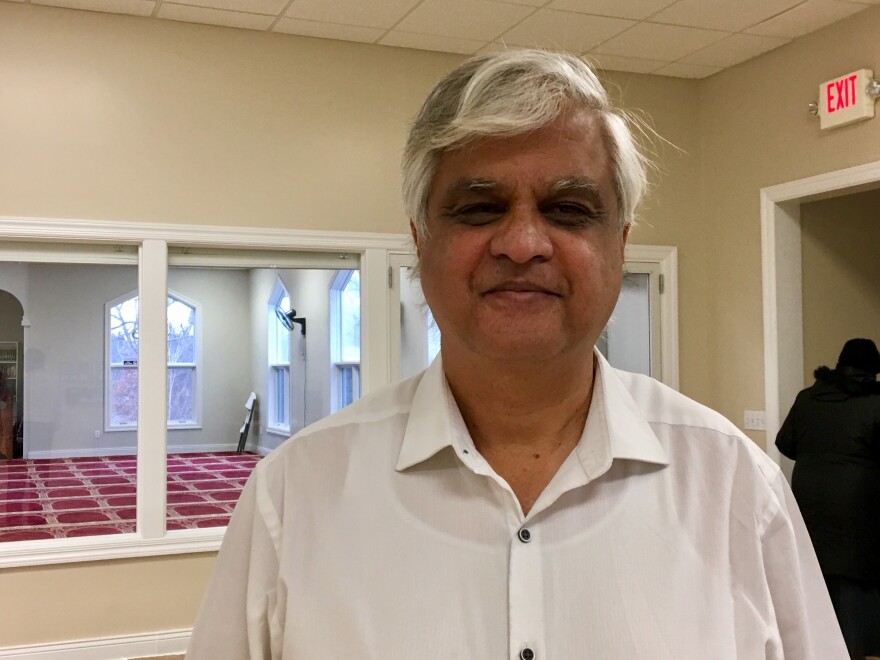Nazir Kayali of Bettendorf talks with his family back in Syria nearly every day.
“Thank God the internet still works over there, so we always communicate texting each other or even calling each other sometimes,” he says.
His two brothers live in Aleppo, which has been ranked as the most dangerous city in the world. Kayali says they chose to stay in the city instead of fleeing the violence and going to a refugee camp.
"They were willing to take risks on their lives and their families’ — they are married, they have kids — because the circumstances of the refugee camps are so bad," Kayali says. "These are the same people in the refugee camps, in these miserable situations and circumstances, that after getting the hope that they might be accepted somewhere in the world, all the sudden someone comes and tells them, 'No, we changed our mind. You are staying where you are.'"

The executive order signed by President Trump Friday temporarily bans travel to the U.S. from seven majority-Muslim countries. It also suspended the U.S. refugee program and blocked Syrian refugees indefinitely.
A federal judge in Brooklyn issued a stay over the weekend that would temporarily prevent deportations of anyone who entered the U.S. with a valid visa, but that was after widespread confusion when several green card and visa-holders were detained at airports.
Kayali, a pediatrician, moved from Syria to the U.S. in 1990. He came over on a student visa after completing medical school and received his training in pediatrics in Des Moines. Then he got an H-1B visa to work in the United States.
"I was moving from visa to visa and these are the same people, same visas, that are being rejected now - being told, 'go back.' It would have been disastrous for me and I know it's disastrous for those who were affected by it."
Kayali says there wouldn't be as much tension if people in this country could focus more on our similarities, rather than our differences.
"Probably, people who have known me did not know that I am an Arab, I am Muslim," Kayali says. "And I am their pediatrician, and I'm their neighbor and I'm their customer. I am, like them, a taxpayer. I also have dreams; I also have family; I also have kids; I also want what's best for everyone."
He says the president's executive order makes the country weaker.
“President Trump did not serve the country," he says. “Actually, he’s hurting my country.”
But Kayali says watching people come together in demonstrations at airports and in cities across the country gave him hope.
"Everytime I look at the news and see people becoming vocal and loud about rejecting the executive order, it brings back good memories of the dream that I have been living since 1990," he says.
Bob Babcock, a member of the Board of Directors for the Quad Cities Alliance for Immigrants and Refugees, calls the new administration's actions "unfathomable" in a country that holds the Statue of Liberty up to such high esteem.
"I'm just really disappointed in the people who are behind this,” Babcock says. “I'm incredibly disappointed."
He says the silver lining has been watching people organize and speak up.
"I believe you understand that this is not what America is about,” Babcock says. “There are lots of people who are here that care about you, care about your families and care about the countries you came from."

The Islamic Center of the Quad Cities is on a stretch of road in Moline that includes an Evangelical Church, Catholic Church, Greek Orthodox Church and the Church of Jesus Christ of Latter Day Saints.
Matlub Ahmad is on the Islamic Center’s Board of Trustees. He calls this concentration of various congregations “Faith Row,” the perfect example of religious freedom.
“There are so many diverse faith groups over here and this is really the beauty of the United States that this represents the diverse community that we are in this country,” he says.
Ahmad, a physics professor at Black Hawk College, has lived in the Quad Cities for 23 years. He moved from Bangladesh to the United States in 1979.
He says he respects the office of the president and Trump’s obligation to keep the country safe, but Ahmad does have concerns about the approach taken through the recent executive order.
"I'm not saying that there is truly a Muslim ban, so to speak," Ahmad says. "We give the benefit of the doubt to the president. But people would say that since it is singling out seven countries that are Muslim-majority, that people might interpret that it might be."
And he says that assumption makes people feel as though they are under a watchful eye of suspicion at all times, which has a demoralizing effect.
Like Kayali, Ahmad says it's important to understand Muslims. The Islamic Center of the Quad Cities regularly invites the community to open houses, tours and informational sessions.
"We are peaceful citizens, we love this country, we dedicate ourselves in this country, and we contribute to the overall improvement of all communities," he says.

